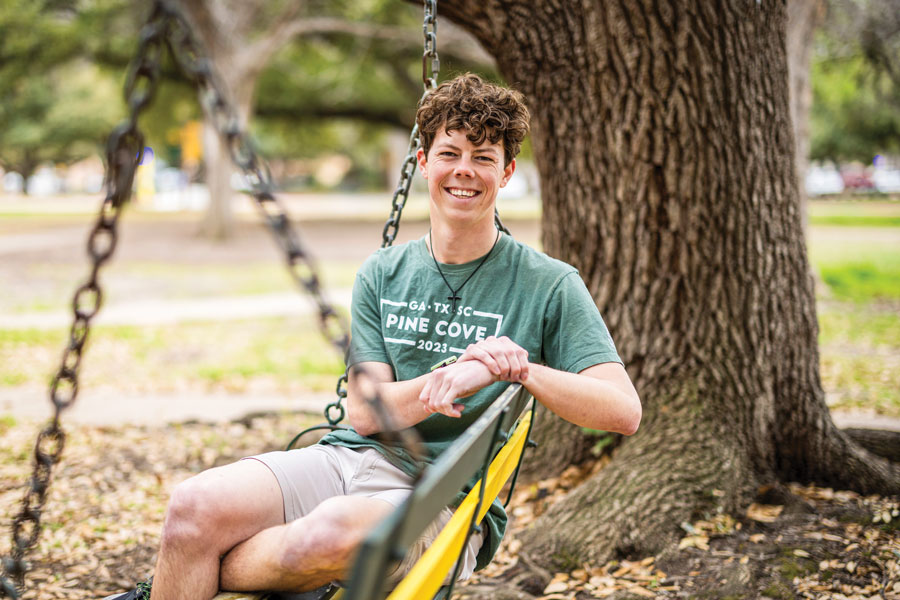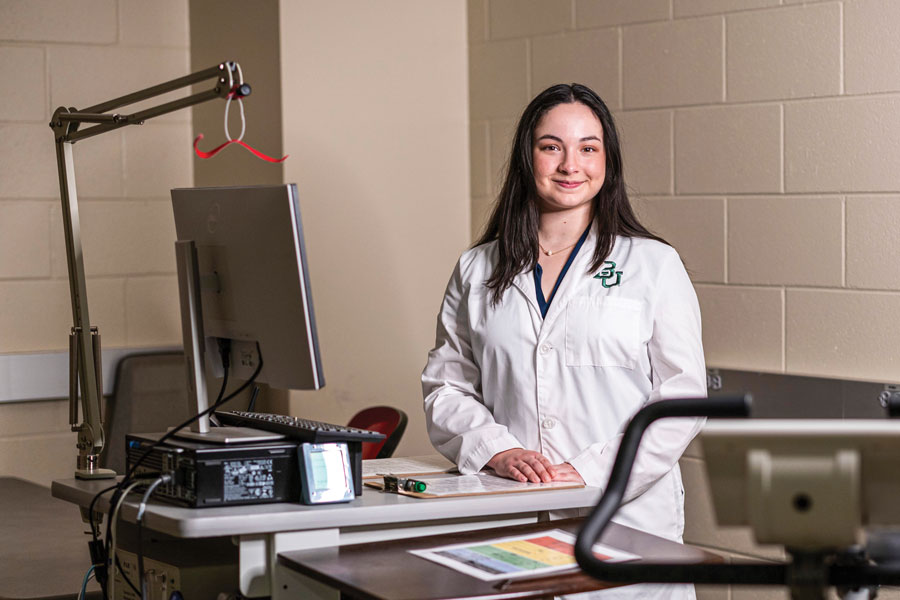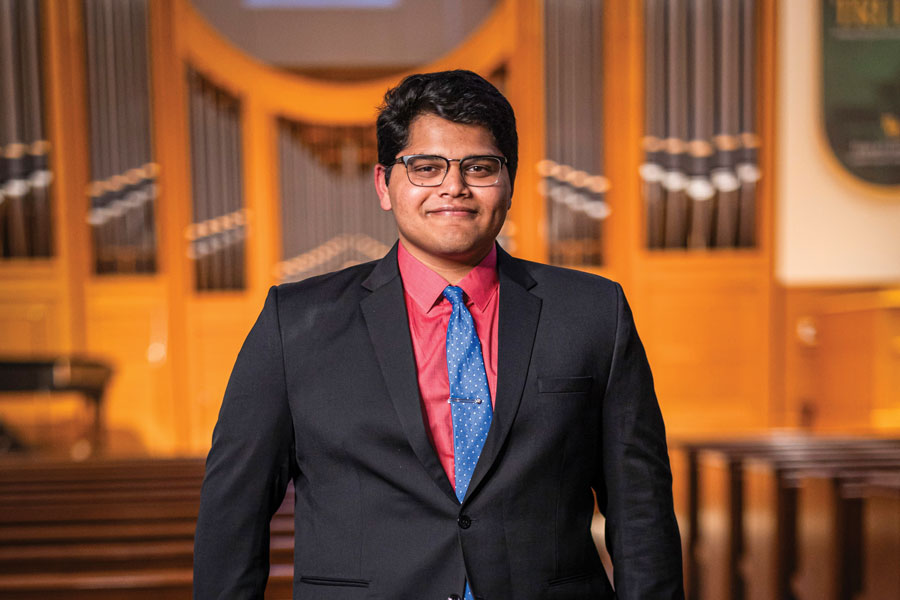Baylor Summer
In the summer months, Baylor students eagerly apply themselves to pursuits that amplify their academic studies.
The summer months at Baylor are far from quiet. These precious three months between the end of one academic year in the spring and the start of a new one in the fall are full of excitement and activity as students explore their passions and goals.
When class is dismissed for the last time in May, students eagerly apply themselves to pursuits that amplify their academic studies. After all, Baylor’s college education is not contained in just the classroom. A Baylor education involves learning in ways that reveal new passions, investing in students’ interests and competencies and expanding the limits of what students thought they could do and where they would go.
There are some expected pathways for students to stay engaged with their academic goals, including taking summer classes and studying abroad. Baylor offers students a chance to catch up or advance their studies with online and in-person classes through Summer of Discovery, and students can travel all over the world with their choice of dozens of study abroad opportunities. Summer classes and study abroad are hallmarks of the undergraduate learning experiences at which Baylor excels, but the possibilities begin — not end — there.
Discovering a Passion
Ria Shani, B.B.A. ’24, graduated in May with a double major in management and Baylor Business Fellows with a minor in biology, and her experiences with Baylor are launching her into healthcare on a global scale.
In the months between her freshman and sophomore years, she participated in the Tropical Medicine Summer Institute offered in coordination between Baylor University and Baylor College of Medicine’s National School of Tropical Medicine. The program, available only to Baylor students, introduces participants to the field of tropical medicine and the diseases — caused by temperature, socioeconomic status and education, among other factors — that disproportionately afflict the world’s population affected by poverty.
“I knew going into college that I had an interest in biology, so this was a way to catapult that interest,” Shani said of investing her time in summer to the program.
The program includes lectures from faculty of diverse disciplines. Participants learn about global health from varied perspectives, including epidemiology, dermatology and veterinary studies, and they complete a group project on a global health topic. Shani’s group took on a project on maternal mortality in Chad, Africa, and presented their project to the National School of Tropical Medicine.
“If you were to do it now,” Shani explained, “you would actually go to Baylor College of Medicine campus in Houston and do everything in person, including hands-on experiments, a tour of the lab and the ability to do the group projects in person.”
Shani admits that her experience with the institute as a rising sophomore during the COVID pandemic was not typical, as distance learning measures were in place due to COVID.
“It was eye-opening that I participated during COVID because the work that they do is global health-related. The National School of Tropical Medicine was working on creating a COVID vaccine — it was something that they were working on and that we were living. I got to understand the importance of studying tropical medicine, infectious disease and global health because we were living the COVID-19 pandemic and had seen first-hand the implications of all of it.”
The following summer between her sophomore and junior year, Shani participated in the Tropical Disease Research Internship Program, which serves as a continuation of the Tropical Medicine Summer Institute. Students who continue to the internship program work in the same lab that they toured during the summer institute to further develop their interests through research.
One particular speaker during the internship emphasized the global scope of healthcare — global health broadly seeks to improve the health of and achieve health equity for all people worldwide.
Shani said her experience in the summer institute and research internship “instilled for me why I want to go into medicine in the first place.”
Shani graduated in May, and she plans to go to medical school and pursue her passion for making a global impact in healthcare. She is even considering working in the field of infectious diseases.
“Both programs allowed me to see people that I admire and that I respect doing work that I would like to do, doing life-changing work, transforming work. It gave me motivation to continue my pre-med journey. I think it was one of the most inspiring things I’ve done.”
Sharing Love and Joy with Future Bears
For sophomore Austin Emery, working at summer camp is a highlight of the year, and the joy of the summer spills into the rest of the year. The past two summers, he has been a camp counselor with Pine Cove City, and he is ready to join the team for a third time.
“My sister was the one who got me interested in working with Pine Cove, and I had the privilege of working with her for my first two summers. I grew up a military kid, so I traveled around often and never had the chance to go to camp as a kid. I wanted something to do for the summer to keep me busy. It sounded like a great opportunity to serve some kids and just have a lot of fun.”
While Pine Cove operates with the traditional summer camp model in which the kids go to camp to stay for a portion of the summer, Pine Cove City brings camp to the kids. Emery is a counselor with Team Edge, and they travel to nine different churches throughout the summer to set up camp for a week in each location for kids aged first grade through sixth grade.
“I never really thought about going into ministry much at all growing up, but working at camp opened my eyes to a lot of different opportunities for me that I could possibly pursue.”
“A big reason for wanting to be a camp counselor was that I could work with kids. I have four siblings and three of them are younger, so I’ve worked with younger children my entire life, which is something I’ve loved doing,” Emery shared. “Another reason is I wanted to do something that was personally meaningful. Pine Cove is a Christian summer camp, so it’s a great way to share my faith and grow as a leader.”
Emery’s experiences at camp have even shaped how he approaches his major at Baylor.
“I never really thought about going into ministry much at all growing up, but working at camp opened my eyes to a lot of different opportunities for me that I could possibly pursue.”
Rather than thinking about ministry as a separate calling, Emery is now considering how he can use his business major to serve ministries or churches.
“Camp has changed my desires and what I want for myself. I want my life to more align with my faith as well. It’s brought both those worlds together.”
Every May, Baylor hosts a camp counselor commissioning ceremony for students like Emery who will spend their summers investing in younger generations. For Emery, the event is evidence of the quick bonds that camp forges.
“It’s a really awesome experience to meet people that work at other camps. People who have worked at camp before can share experiences between camps. It’s a great time of community that Baylor provides us with.”
Camp has woven together Emery’s approach to school, his connection to peers and service in his church, but the biggest outcome is getting to share love and joy with the kids year after year.
“It’s awesome to see the kids love to live with each other, go through life together and even comfort each other in some circumstances. It’s just awesome to see that childlike joy and that childlike faith.”
A Gateway to Research
Felise Bressler is a junior in the University Scholars program studying neuroscience and psychology with a minor in sociology. She knew when she first came to Baylor that she was interested in doing research, but she didn’t know what form that would take in her studies.
“I really enjoyed the creative process of building something, seeing it through with actual participants and getting data back,” Bressler said of her high school experience. “I was excited to hear that Baylor was very much advocating for undergraduates to get into research early.”
It was through a lab at Baylor that Bressler’s research horizons continued to grow. She got connected with the behavioral medicine lab with Associate Professor Annie Ginty, Ph.D., in Baylor’s psychology and neuroscience department. With encouragement from her professors, including Ginty and Lecturer Ben Schwartz, Ph.D., Bressler applied to summer research internships to learn more about research in other labs. She chose the internship at the University of Connecticut, where she joined the Sciolino Lab studying a structure in the brain called the locus coeruleus.
The internship spanned 10 weeks, and Bressler spent 40 hours a week in a research lab. She worked under the mentorship of a graduate student in the lab, who taught her the techniques used.
“My experience with Baylor’s lab taught me the art of research and helped me figure out how to learn procedures quickly. A lot of the translational skills were really helpful at the University of Connecticut, and I think that’s what made me successful and thrive in that internship because I was able to have previous research experience.”
Bressler plans to continue engaging in research at the graduate level, and her experience with the summer internship was instrumental in helping her define her particular research interests.
“I have a really big interest in both psychology and neuroscience, so I wasn’t quite sure what path I wanted to go down. With my experience at the University of Connecticut, I was able to figure out that I really enjoy learning about neural circuitry, and I really enjoy seeing how the brain is organized. That pushed me in that direction, and now I’m able to know exactly what my interests are going into grad school.”
She hopes to see another lab during a research internship, but this time with a focus on scouting places she is interested in for graduate school.
It is important to Bressler to get a feel for the community in a lab since that can make or break the experience of participating in research.
“One of the main reasons I chose Baylor was that community. The professors and principal investigators care about your success, and they’re willing to mentor students and to help guide our paths. Their continuous support was helpful and informative in going to do summer research, as well as continuing that research through presenting it at conferences. And I’m sure that they’ll also be there for when I apply to graduate school.”
Refining a Craft
For an actor, every chance to be on stage is an opportunity to expand and refine their craft. Maddie Smith, a junior theater performance major, not only had the chance to be cast in a different role than any she has played before, but she also got to work with a new director and have a hand in more parts of the production than she would typically have in a show.
As Smith said, “Any project that I get cast in has always left me with something that helps me become a better actor.”
One of the biggest differences between a summer play and a regular season’s production during the fall or spring is the number of people involved in putting on the show. In a regular season production, there are different crews for designing sets, costumes and lighting, as well as a larger cast. In the Baylor Theater summer 2023 production “Cry It Out” by playwright Molly Smith Metzler, just seven people were involved in putting on the show, undertaking these diverse tasks. Smith was one of four actors that made up the cast, in addition to a stage manager, an assistant stage manager and the director.
For Smith, the intimacy of the smaller crew was a highlight. “Working with them that closely, I’m honestly really grateful for the experience because I wouldn’t have been able to get to know those people as well as I did.”
Another difference Smith experienced in the summer production was the play was not directed by a Baylor instructor, as most regular season shows are. Summer productions are the playground of graduate students.
“Working with different directors is really helpful as well because every director has their own process,” Smith said of working with M.F.A. candidate Alex Stahl. Working with a graduate student was unique in this summer opportunity because “they are learning too as we’re learning, and the process is typically very collaborative.”
The summer production was especially impactful for Smith’s craft because she played a character that she describes as “the total opposite of anyone I would play.” The figure Adrienne comes off as rude and unlikeable in the script, but Smith’s job is to try to understand the character better.
“When you dive into it, if I played it well, it comes off as well that there’s something deeper there. That was something that I probably wouldn’t have been able to experience had it been cast in a main stage, because I probably wouldn’t have been cast as someone so rude.”
“Alex really took a chance on me and cast me in a part that I have never, ever played before. Her feedback was really helpful, and she helped me grow as an actor.”
Hearts and Minds on the Hill
Jayanth “Jay” Jasti came to Baylor to complete the last two years of his bachelor’s degree, and he made the most of his Baylor summer between academic years.
Jasti joined the inaugural cohort of the Summer Fellowship for Religion & Social Life in Washington, D.C., a two-month Baylor program designed for students to explore how religious life impacts communities as they prepare for lives of service and leadership.
“Ever since I became a Christian,” Jasti reflected, “I realized that my goal in life, within any profession, within any field, was to serve God and to glorify Him, to love other individuals in the best way that I can.”
Baylor provides housing and weekly stipends so that students can live, learn and work in the heart of the city. The crux of the Fellowship program was weekly seminars on topics related to public policy and the social impact of religion. Speakers from a wide array of professions spoke about how their Christian identity affected their work and who they are within their work.
“The program and these individuals within the program showed me that you don’t have to work within a Christian environment to show your faith. It’s actually the opposite. We are called to go to the places that need the love of Christ.”
“You need to win people’s heart, and the way you do that is to love them personally.” – Jayanth “Jay” Jasti
In addition to this time for learning and vocational development, each individual was matched to an internship with an organization working at the intersection of religion and politics.
Jasti found the perfect internship fit with Ministry to State, a church ministry that works with the interns of congressional offices on Capitol Hill to build personal connections and share the love of Christ.
“The experience with Ministry to State showed me the gifts that I have and the amount of joy that I have while doing ministry,” Jasti said.
Jasti’s experience on the Hill not only revealed new ways of being a Christian in different professions, but it also uncovered a skill and passion for ministry.
“I don’t believe that I would have ever taken the leap towards ministry if it weren’t for this program, and if it weren’t for how much I enjoyed it,” Jasti said.
Because of his experience in Washington, D.C., Jasti is pausing on pursuing law school immediately after graduation. Instead, he is joining a two-year program to intern with a campus ministry called Reformed University Fellowship, where he will work with international students at Texas A&M.
Law school is still on the table, though, once he completes his time with the campus ministry. Whatever lies ahead for him, Jasti believes “it could be a way to serve God.”
“This experience has shown me what it means to love people even when I have a seat at the table,” Jasti said. “You need to win people’s heart, and the way you do that is to love them personally.”
Summer is an opportunity for students to capitalize on time spent away from the classroom. Whether on campus or far from Waco, Baylor students take advantage of resources, experiences and expertise for creative, explorative and sometimes even life-changing summers.




